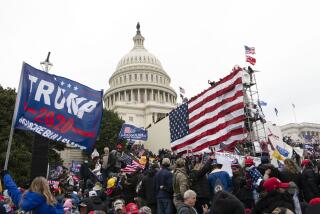Immunity Is Out, Panel Chiefs Say : Lawmakers Refuse to Offer Poindexter, North Protection
- Share via
WASHINGTON — Congressional investigators refused Sunday to exchange immunity from prosecution in the Iran- contras scandal for the testimony of John M. Poindexter and Oliver L. North, despite a frustrating week in which the two former White House aides invoked their Fifth Amendment rights against self-incrimination to avoid talking to lawmakers.
Any attempt to strike a bargain for the testimony would interfere with the criminal investigation to be conducted by an independent counsel expected to be named this week, House Foreign Affairs Committee Chairman Dante B. Fascell (D-Fla.) and Senate Intelligence Committee Chairman Dave Durenberger (R-Minn.) both said.
Pieces of Puzzle
Durenberger, interviewed on ABC’s “This Week With David Brinkley,” said his committee has assembled “95 pieces of a 100-piece jigsaw puzzle” in its attempt to unravel the relationship between arms sales to Iran and diversion of part of the profits to the Nicaraguan rebels.
But, he cautioned, it might take a year or more to assemble the rest of the picture unless Poindexter and North begin to cooperate.
And Fascell, interviewed on CBS’ “Face the Nation,” said it was “premature” for congressional committees to even consider grants of immunity. However, Fascell said he might feel differently in a few months “after the independent counsel has had a chance to look at the record.”
If Congress granted North or Poindexter immunity, they could be required to testify even about matters that might be incriminating. But federal prosecutors would be barred from using that information in court, unless they could show that they had obtained it independently before the testimony was given.
Rodriguez Contacts
Meanwhile, Vice President George Bush ordered his national security adviser, Donald P. Gregg, to prepare a full accounting of his contacts with Felix Rodriguez, a former CIA operative who has been linked to ostensibly private efforts to supply arms to the contras.
Marlin Fitzwater, Bush’s spokesman, said the vice president ordered Gregg to submit the report today after Gregg, a former CIA official, revealed in newspaper interviews that he had set up a meeting last August between Rodriguez and representatives of the CIA, the State Department and the Pentagon to discuss aid to the contras.
It was the first confirmation that anyone on Bush’s staff knew of the link between the contras and Rodriguez, who used the nom de guerre Max Gomez. Earlier, Bush had said he met at least three times with Rodriguez but believed the Cuban exile was working for El Salvador’s military Establishment.
“We clearly want to get on the record all the information about Gregg’s contacts with Felix Rodriguez,” Fitzwater said. “I think it is important to preface this by saying it does not have anything to do with transfer of Iran arms money or the Iranian initiative, both of which Don Gregg says he has no knowledge of.”
Gregg was interviewed by the New York Times and the Washington Post. He confirmed the accuracy of the newspaper accounts in a brief telephone interview with The Times but refused to answer other questions.
In another television interview Sunday, former White House National Security Adviser Robert C. McFarlane said he prevented two planeloads of weapons from reaching Iran last May after Iranian authorities failed to keep their promise to obtain the release of all U.S. hostages in Lebanon.
Orders Planes Back
McFarlane told Diane Sawyer of the CBS program “60 Minutes” that when he traveled to Tehran on May 28 aboard an aircraft carrying weapons, two more planeloads had been scheduled to follow. He said he had been assured that the hostages would be released at the same time, and when they were not, he ordered the other two planes to turn around.
“It became apparent that they (Iranian officials) were not yet strong enough to be able to act . . . to really deliver,” McFarlane said. He said the failure to release the hostages was “one obvious expression” of the weakness of the Iranian officials he had contacted.
McFarlane also repeated his earlier assertion that he first learned of diversion of Iran arms profits to the contras when North told him about it during that visit to Tehran. According to McFarlane, North said the Tehran visit was not “a total lost cause” despite the failure to obtain release of the hostages because some of the money would be used to support the rebels.
In another development Sunday, Senate Republican leader Bob Dole of Kansas urged President Reagan to appoint a distinguished lawyer to act as White House chief of staff on matters concerning the Iran-contras connection. But Dole said White House Chief of Staff Donald T. Regan had “done a pretty good job” overall and should not be ousted as a result of the scandal.
Regan ‘Not Leaving’
“I talked with (Regan) last evening,” Dole said on the NBC program “Meet the Press.” “He said, ‘I’ll tell you one thing, I’m not leaving the White House.’ ”
However, Dole was far less certain that CIA Director William J. Casey would weather the storm.
“Don Regan’s going to stay--I don’t know about Bill Casey,” he said.
Casey, in an interview with Time magazine, said the CIA intentionally avoided learning too much about where the contras were getting their funds.
“I think we knew in a general way that money was being raised and probably could have put a report together on it if we wanted to, but we didn’t,” Casey said. “We were not running the operation. We were supporting that. . . .”
More to Read
Get the L.A. Times Politics newsletter
Deeply reported insights into legislation, politics and policy from Sacramento, Washington and beyond. In your inbox twice per week.
You may occasionally receive promotional content from the Los Angeles Times.








